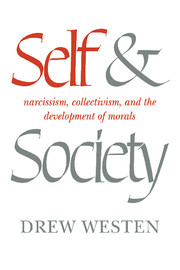Book contents
- Frontmatter
- Contents
- Preface
- Part I A theory of personality
- 1 Personality theory: the three faces of psyche
- 2 Emotion: a missing link between psychodynamic and cognitive-behavioral psychology?
- 3 The structure and dynamics of personality
- 4 The development of personality, narcissism, and moral judgment
- Part II A theory of culture
- Part III Personality and culture: a synthesis
- References
- Index
4 - The development of personality, narcissism, and moral judgment
Published online by Cambridge University Press: 11 November 2009
- Frontmatter
- Contents
- Preface
- Part I A theory of personality
- 1 Personality theory: the three faces of psyche
- 2 Emotion: a missing link between psychodynamic and cognitive-behavioral psychology?
- 3 The structure and dynamics of personality
- 4 The development of personality, narcissism, and moral judgment
- Part II A theory of culture
- Part III Personality and culture: a synthesis
- References
- Index
Summary
Throughout psychology's brief history the notion of “stages,” invariant sequences of unfolding needs or competences, has been an integral part of theorizing about psychological development. The field's two most imposing intellectual figures, Freud and Piaget, both proposed stage theories, one of psychosexual, and the other of cognitive development.
In recent years psychologists have begun to wonder whether in fact the invariance and orderliness of stages is a property of the object of study or an artifact of the schema-building of the observer (see Flavell, 1971, 1982; Keil, 1981). Of course, it is both: science, like all human cognition, entails the imposition of categories of thought upon sensory experience to make it meaningful and manageable. It was Piaget's genius that allowed him to discern an orderly sequence in cognitive development, but he was surely constrained by the “facts” to put something like formal operations at the end and not at the beginning of that sequence.
When a theorist introduces a term such as stage, just as when he introduces a concept like “structure,” he must be careful to delineate precisely what he means, so that the concept does not, like a malevolent spirit, live on beyond its usefulness, wreak havoc on those who make its acquaintance, and elude the grasp of even those who invoke it frequently. In this chapter I will, indeed, invoke this charmed metaphor in a way perhaps best described through another metaphor. The conception is of sequential sets of processes that shape current functioning much as a series of waves shapes a shoreline.
- Type
- Chapter
- Information
- Self and SocietyNarcissism, Collectivism, and the Development of Morals, pp. 128 - 186Publisher: Cambridge University PressPrint publication year: 1985



